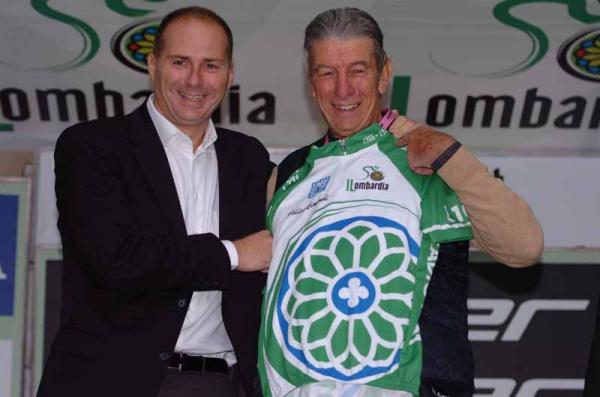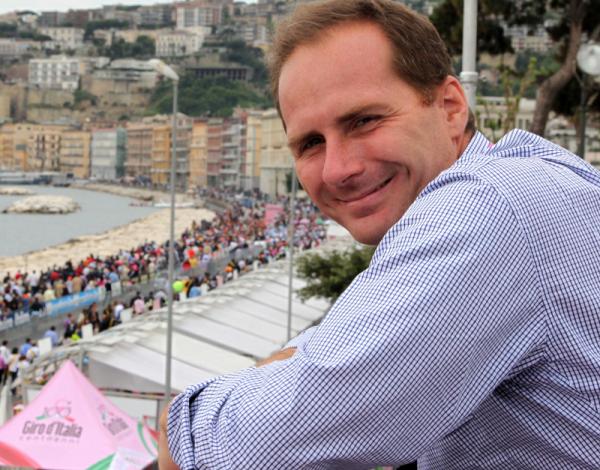Italian races relying on passion to survive, says Acquarone
Giro director on organising races in difficult economic times


With the GP Camaiore, Strade Bianche, Roma Maxima, Tirreno-Adriatico and Milan-San Remo taking place in quick succession over the coming two weeks, Italian cycling appears on first glance to be in rude health. Appearances can be deceptive, however, and the harsh reality is that Italy’s bleak economic situation means that top-level racing is increasingly at risk in the country.
A number of races have already fallen by the wayside in recent years due to a lack of funding, including the Giro della Provincia di Reggio-Calabria, Giro di Sardegna and Brixia Tour, and the races run by Giro d’Italia organisers RCS Sport are not exempt from a similar fate.
In a blog for Cyclingnews last year, Giro director Michele Acquarone revealed how close Strade Bianche had come to folding following the withdrawal of former title sponsor Monte dei Paschi di Siena and, twelve months on, the long-term prognosis is scarcely any better for RCS races outside of the Giro itself.
“It’s worse, always worse. It makes you want to cry if you look at the market in Italy today because sponsorship isn’t coming and tax is rising,” Acquarone told Cyclingnews. “It’s very complicated to organise races because cities and local councils have less and less money to spend on sport. Our country is in great difficulty, but we’re hanging in there because we love this sport too much and we have faith in the future.”
Ironically, Acquarone was speaking in Dublin at the announcement that the 2014 Giro would begin in Ireland. Stages on foreign roads are increasingly becoming a necessity in order to boost the Giro’s coffers, though RCS Sport’s overseas activities are not restricted to detours during the corsa rosa: in January, it was announced that RCS will organise the inaugural Dubai Tour in 2014.
However, Acquarone stressed that it would be remiss to think that RCS could subsidise its Italian activities using money from the venture in the Gulf, nor is that the intention. “Every project is a project in itself,” Acquarone said of the planned Dubai race. “Certainly, we can do a good project with some profits but not enough to bankroll the races in Italy.
“If the races in Italy don’t succeed in getting back into the black, paying their way and finding sponsors, then sooner or later, we’ll be forced to shut them down because it’s hard to maintain them with what we do outside of Italy.”
The latest race content, interviews, features, reviews and expert buying guides, direct to your inbox!
Roma Maxima
Yet against that sobering economic backdrop, Acquarone and RCS are continuing to plough resources into their full portfolio of Italian races, rather than focusing solely on the Giro. An addition to their spring programme in 2013 (which also includes Strade Bianche, Tirreno-Adriatico and Milan-San Remo) is the resurrected Giro del Lazio, which has been re-branded as Roma Maxima, and takes place on Sunday.
“The Giro del Lazio used to be part of the World Cup but then, little by little, it disappeared,” Acquarone said of the race, which last took place in 2008. “Roma Maxima came about because Rome is too beautiful a city not to have a big race in it.”
Acquarone points to the strength of the field of this year’s Tirreno-Adriatico, which overshadows that of Paris-Nice, and its television coverage across five continents as a validation of this “if you build it, they will come” mentality.
“This year we’ve fortunate that all of the big champions want to race Tirreno-Adriatico,” he said. “This shows how we’ve worked hard in the past to create the right atmosphere around this race. They’re coming for a real race and not for training, too, as might have been the case in the past. It’s clear that our trident trophy is becoming coveted.”
But if enthusiasm is helping these races to survive in a time of austerity, Acquarone is mindful that simple economics will ultimately decide whether or not they persevere in the long-term. “If people didn’t have so much passion, you could shut down 90% of races in Italy,” Acquarone admitted. “When you do these things, it’s because you believe that it will help to attract interest, people and enthusiasm, and then as soon as the economy recovers, you will have a nice product too. It’s a gamble, a big gamble. But it’s like gambling on Milan beating Barcelona…”

Barry Ryan was Head of Features at Cyclingnews. He has covered professional cycling since 2010, reporting from the Tour de France, Giro d’Italia and events from Argentina to Japan. His writing has appeared in The Independent, Procycling and Cycling Plus. He is the author of The Ascent: Sean Kelly, Stephen Roche and the Rise of Irish Cycling’s Golden Generation, published by Gill Books.